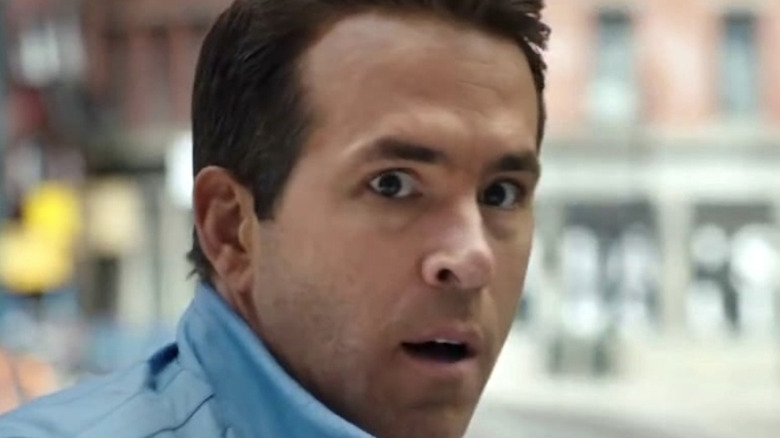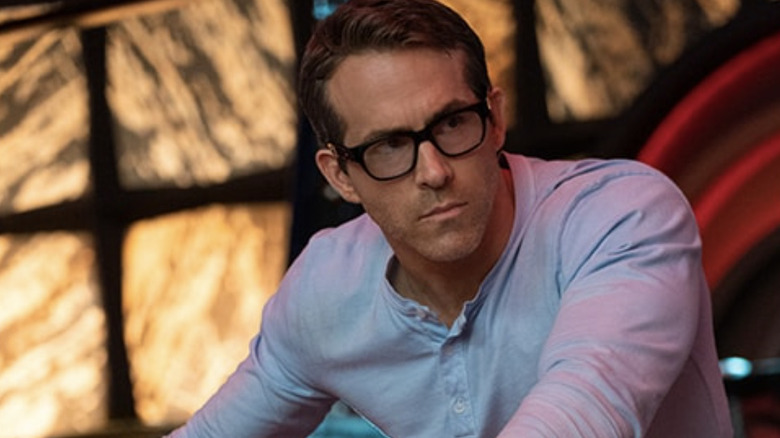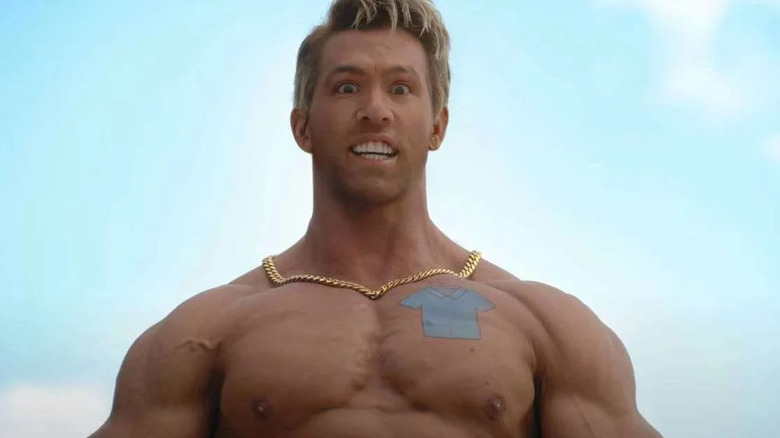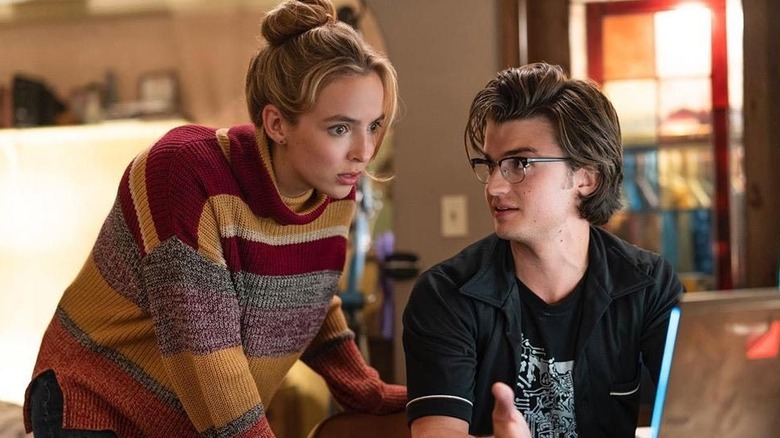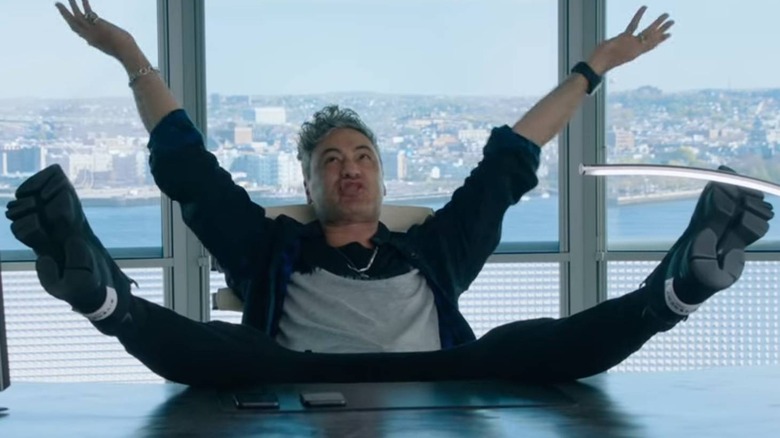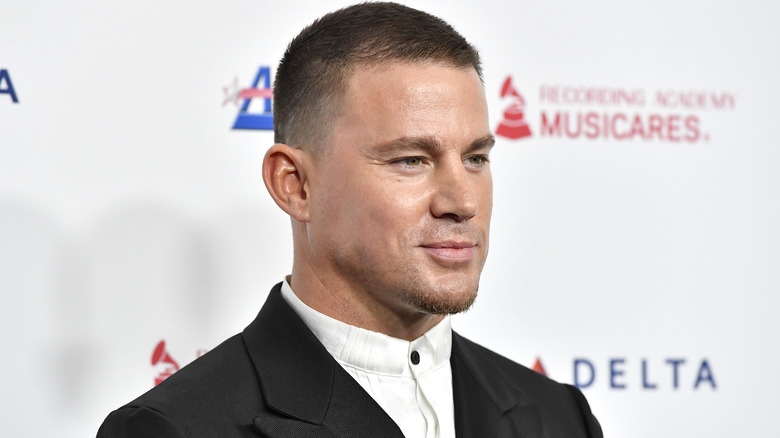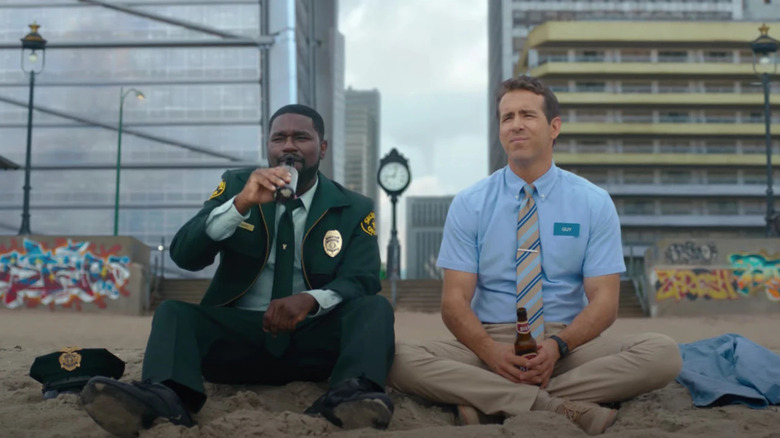The Ending Of Free Guy Explained
Clocking in at just under two hours, "Free Guy" is a breezy, often uproarious comedy/action film that plays like "The Truman Show" meets "Wreck-It Ralph." For those of you who haven't caught one of the approximately 83 trailers and accompanying new release dates rolled out since early 2020, the flick tells the story of Guy (Ryan Reynolds), a Non-Player Character (NPC) accustomed to a life in the background of his video game, entitled "Free City." When Guy gets ahold of some sunglasses that let him see his world for what it really is, and finds himself entranced by Molotov Girl — an in-game avatar of real-world ostracized game developer Millie (Jodie Comer) — he finds himself suddenly determined to become the hero of his own story.
What follows is an epic, world-building battle against Antwan (Taika Waititi) — the egotistical game publisher determined to squash Guy and launch a sequel with Dude (Ryan Reynolds), a musclebound ripoff designed to capitalize on the NPC's newfound popularity with gamers around the world — and Millie and Keys (Joe Keery), the developers who helped build the game, only to be squeezed out. With Antwan and his loyalist Mouser (Utkarsh Ambudkar) working to shut the game down, and Guy and Molotov Girl racing to find evidence that Millie and Keys are the true "Free City" masterminds, the game hosts a virtual smackdown with seemingly the entire real world tuning in.
But by the time the credits roll, you may find yourself leaving "Free Guy" with as many questions as answers. On the surface, the film seems to be saying one thing — but underneath, just like in Free City itself, there seems to be more than meets the eye. So pour yourself a delicious coffee with two sugars (no cappuccino!), settle in and read on for a (spoiler-heavy) dissection of the ending of "Free Guy."
The Guy with the happy ending
On the surface, Guy seems to have earned himself a happy ending at the end of "Free Guy." His game has not only been saved, but is being drastically re-written by Keys and Millie into a world-blending, good-natured open-worlder that includes more vegetation and apparently, dinosaurs. Guy is reunited with Buddy (Lil Rel Howery), his best friend who seemed to sacrifice himself for the greater good during the epic Dude battle down at the shore. Mariah Carey is playing, his world seems likely to go on indefinitely, and he helped Keys and Millie find true love.
But is Guy truly headed for a happy ending? As Buddy drops his weapon belt one last time to live in a world without violence, it seems highly likely that any video game allowing online players to participate via avatar is destined to encounter some level of hijinks. Whether it's more Channing Tatum-like dudes who want to dance suggestively in front of the NPCs, or additional bank robber types who will inevitably try and throw poor Joe through the window of his store again for old times' sake, it seems quite certain that Buddy will someday have to pick up his weapon again.
Then there's the matter of Guy's very essence, constructed to be attracted to Millie, finding her every movement, comment and even her favorite ice cream to be exactly what he longs for in a soulmate. By the end of the movie, this has not changed. Guy drove Millie into the arms of Keys, giving the duo their happy ending. But what about Mr. Blue Shirt himself? Is Guy supposed to wander around for the rest of eternity, burdened by the weight of self-awareness, unable to find the companionship every fiber in his being was constructed to desire? It's a weighty question, and one the ending seems to consider a third rail.
Dude!
Far and away, the funniest character in "Free Guy" has to be Dude — a hastily created, musclebound ripoff of Guy uploaded to the game in an unfinished form that has him delivering lines littered with "TBDs" and punctuated by his amazing catchphrase: "CATCHPHRASE!"
After doing his best to kill Guy during their epic fight, Dude eventually comes to his senses and joins the good guys in their effort to expose Antwan for the copyright-stealing baddie he truly is. In the film's final moments, as all the heroes find happiness, Dude can be seen waving and smiling and seemingly finding whatever a happy ending looks like in his half-completed consciousness.
But where does Dude go from here? It doesn't seem as though Millie and Keys have plans (or perhaps, the know-how, since they didn't create him) to finish Dude and make him a whole person. Guy seems to tolerate Dude as a friend, but as we see in their last interaction, whenever possible he'd much rather cross the street and hang out with Buddy. Dude essentially feels like some sort of puppy — enthusiastic, protective, but able to interact with other beings on only the most basic level.
Here's hoping that, in all those buildings we see around town, Free City has a decent gym — because Dude clearly likes to work out. He also might want to look into a good tattoo removal service, because as funny as that blue shirt tattoo on his left pec is at first, that ink is not gonna age well.
The Keys to everlasting love?
For years, Keys and Millie have been toiling away alongside one another, unable to bridge the awkward gap between them — until Free City facilitates Keys' desire to profess his undying love. By the end of the film, romantic comedy cliches be damned, Millie is running through the streets after her just-revealed soulmate (seriously, she couldn't have waited for him to come back with the coffee?), eager to embrace and live happily ever after.
But are these crazy kids destined to marry, get a house in the suburbs with a white picket fence and have 2.5 children? Everything we've seen over the last two hours shows them to be a very dysfunctional pairing. Clearly, the two have severe communication issues, spend more time staring at screens than each other, and have a tendency to connect with people more easily in virtual environments than real ones. You don't have to be a couples therapist to see their red flags coming a mile away.
Perhaps such concerns will be ironed out as the years go by. For now, it seems likely that Keys and Millie are planning a big wedding, with the DJ playing a lot of Mariah Carey. Antwan will most likely not be invited, Mouser will simultaneously serve as the best man and maid of honor (that guy always seems to be working both sides), and some sort of virtual connection will allow Guy, Buddy, Dude, and all the other virtual residents of Free City to participate.
Millie and Keys just need to make sure they do not invite that guy who can't put his arms down. Because when it comes time for the officiant at the wedding to ask if anybody objects ... well, you can see how he would become a problem.
Antwan's comeuppance
The antagonist of "Free Guy" is a spoiled billionaire brat possessing a serious sense of entitlement, a god complex — and a really off-the-wall style of dress. Taika Waititi's character eventually becomes unraveled, desperately slashing away at servers with an axe in an attempt to destroy Free City (and Guy) before the good guys can expose him as the copyright-stealing, questionably-talented figurehead he really is.
Then ... well ... his character kinda disappears. As Guy locates the source code developed by Keys and Millie and has the power to expose their contribution to a worldwide audience, a deal is struck that will allow them to keep "Free City" (and by extension, Guy and his friends) alive. Antwan, the film implies, can go off and make sequels, which probably won't do very well without the creative talents of his developers.
So can it be assumed that Antwan faced consequences for his actions? Depending on how you read into the "existence" of the NPCs, he may have conceivably killed hundreds of beings — alive in every traditional sense of the word except the self-awareness granted by Guy's AI, essentially rendering them similar to pets and other animals. By taking that axe to all but one of those servers, Antwan wiped out hundreds of NPCs, even by the most conservative estimate.
Did Antwan face jail time for his actions? Highly unlikely, since the copyright theft was buried and we never see any scenes of police taking him away. Perhaps a sequel could depict Antwan's lawyers, attempting to defend him against a prosecutorial team out to prove that all those NPCs were effectively human beings — and Guy as the main witness, attempting to get "human" rights for his compatriots. It would be like "Bee Movie" meets "The Trial of the Chicago 7."
Will Channing Tatum play the new game?
It's easy for the "Free Guy" movie to paint a happy ending where Millie and Keys' idealistic, Garden-of-Eden-like new take on "Free City" is a big hit video game that everybody loves — but in real life, would it be a success? As we see in "Free Guy," the average player seems to be male, nerdy, living with their parents and playing so they can do all the things they can't do in real life without risking jail time: rob, kill, shoot flamethrowers, drive fast cars with bombshell girls in the passenger seat, and so on.
This is best exemplified by the Channing Tatum cameo. As Guy discovers, it isn't really the movie star, but some candy-scarfing dweeb who just wants to dance, livestream goofy stuff to his followers, and blow things up. Oh yeah, he also wants to look and sound like Channing Tatum, which is why Guy sees what he sees.
Would that player want anything to do with the new "Free City"? Unlikely. In fact, based on what we saw of the old, chaotic, endlessly violent "Free City," very few of the old players would come along for this re-imagined ride. Instead, Millie and Keys (and Mouser, who landed a job with them) would have their work cut out for them as they appeal to an entirely new audience, convincing them that the very game itself has completely changed.
It would be the equivalent of "Grand Theft Auto" releasing its newest game tomorrow — and it being like "Animal Crossing." Loyal "GTA" enthusiasts would be in an uproar, and good luck enticing that new, intended audience after years of "GTA" controversies surrounding the game's violent elements.
Are there more AI-powered NPCs to come?
At the end of the film, we see that Guy has become a household name, "Free City" seems to be more popular than ever before, and there are still plenty of NPCs in this next incarnation of the game. So it would seem likely that Millie and Keys will replicate their AI experiment time and again, making more and more self-aware NPC characters with their breakthrough technology.
But would this be a good thing? Would gamers really want to play a game where every single background character thought they were the main character? On the other hand, isn't that life?
This much seems certain: If every NPC in a video game was self-aware and had essentially all the characteristics of a human except real-world flesh and bones, the game would be a mess. Forget about stealing people's cars, running them over or robbing banks — all vicarious thrills that games like "GTA" play off of because, well, you're not able to do that stuff in real life, but simulating the experience nonetheless produces a primal, undeniable adrenaline rush — if we knew as players there was an actual living being on the other end of the controller, we'd be inclined to apologize every time we bump into one on the sidewalk. There'd be pressure to hold doors open for people. That sounds like a really boring game.
Furthermore, if every NPC thought they were the main character, could you imagine how hard it would be to give a game any sort of plot, missions, or overall goal? Perhaps you could measure success in the game the same way some measure success in real life — money accumulated, job title achieved, etc. — but honestly, at that point, it would probably just be better to turn off the game, say goodbye to Guy once and for all, go outside, and enjoy the real world.
